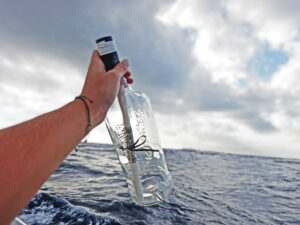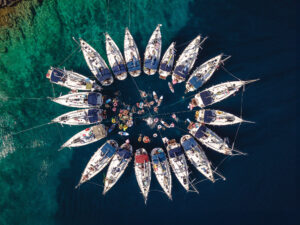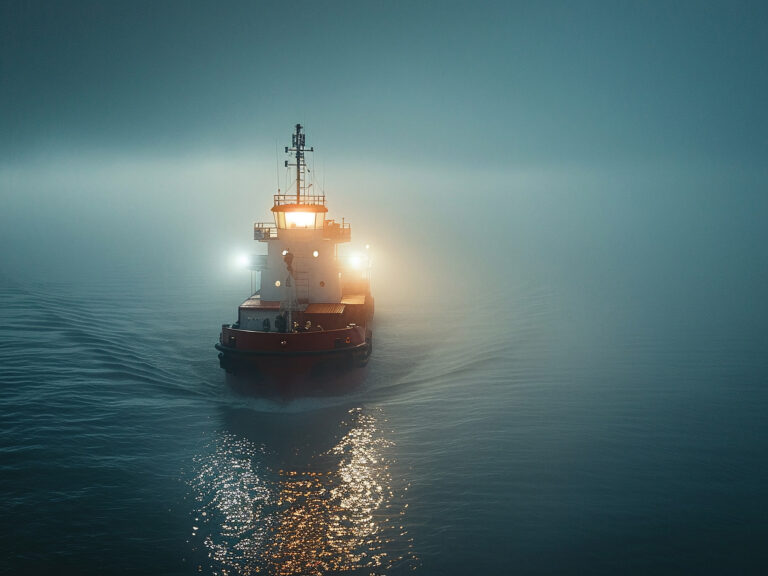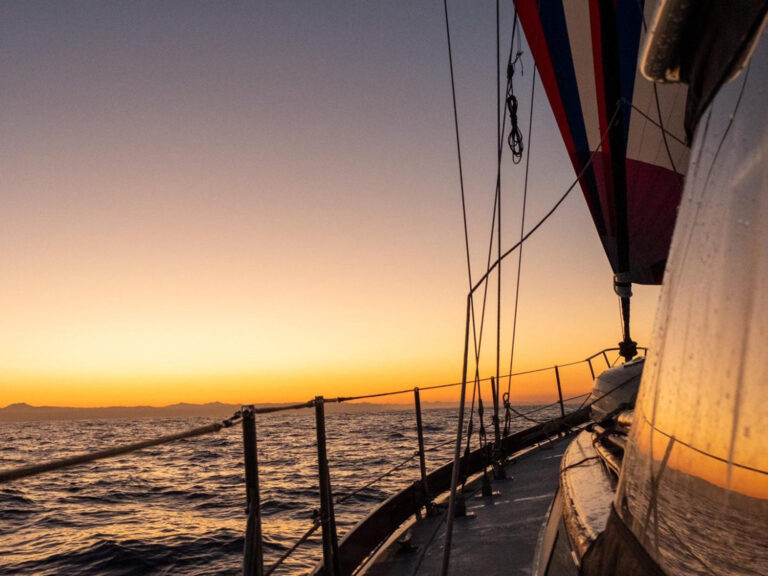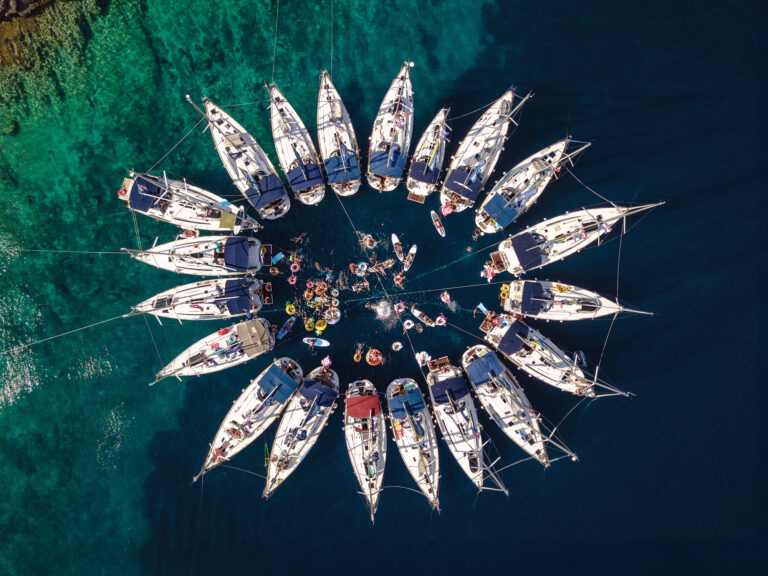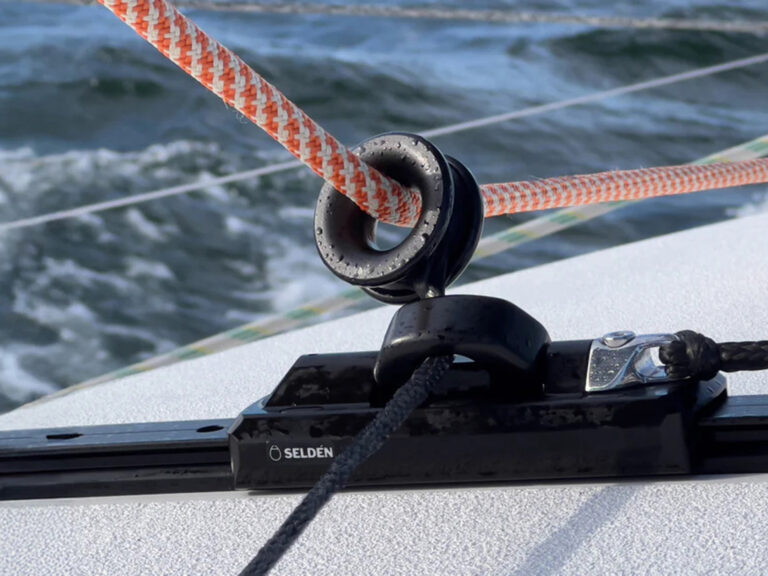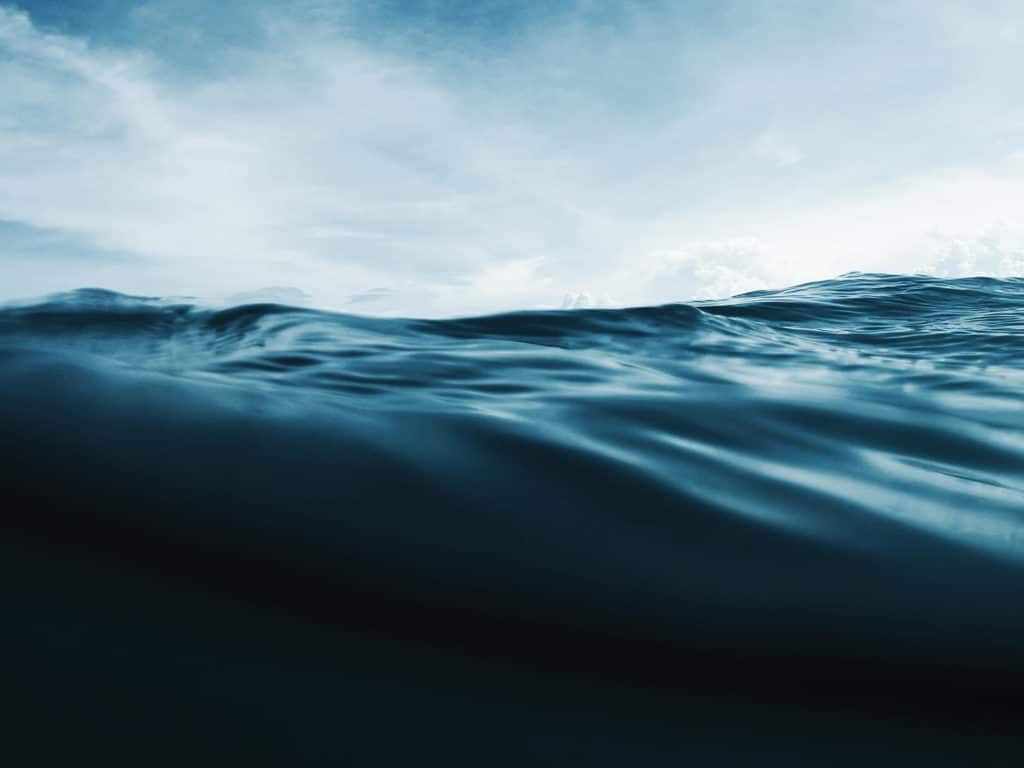
The captain of the 55-foot Holman sailing yacht was crouched down and leaning over me with great anxiety. “Are you OK?” he asked. “Dad, are you OK?”
I was, indeed, OK, which was as much a surprise to me as anyone else, given that I had hurtled across the galley like an unstrapped astronaut at liftoff. The boat had pitched, I hadn’t been paying attention, and I had gone flying so fast that I would have just kept going if not for a cabinet that stopped my midair trajectory.
My ego was bruised—“Pain, Dad, is a great teacher,” he said—but I was fine, which is more than I could say for the cabinet door. And that, in itself, was really saying something, because the boat dated to 1985 while I dated to 1939.
Yes, my friends had told me that I was “loco” to sign on as crew at age 78 for a 2,850-nautical-mile passage from San Diego to the Panama Canal. It wasn’t the first time that my son, Christian Pschorr, who is service and program director for Hylas Yachts, had asked me to join him on a passage, but for the past few years, I had refused. Days and nights of getting pounded by bad weather, I feared, might leave me unable to hold up my end of the responsibilities. I didn’t want to let down the rest of the team.
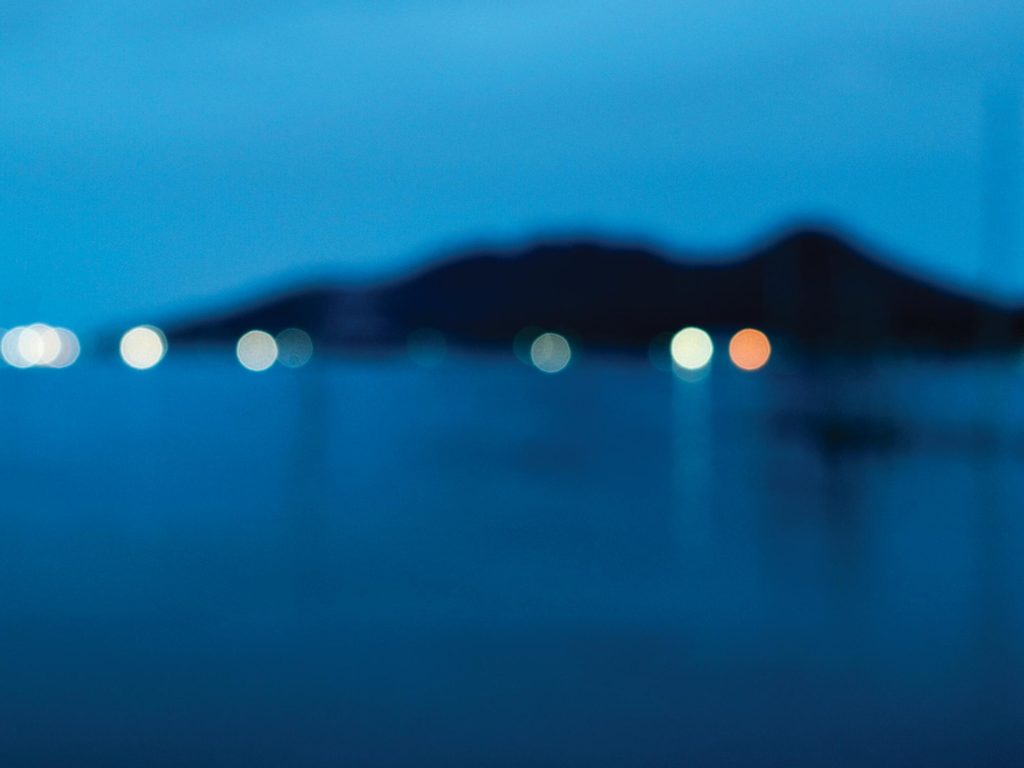
It’s not that I was unfamiliar with boating, or with tough physical challenges. At age 22, when I graduated from the University of Pennsylvania as an ROTC Marine option, I was a commissioned US Marine Corps officer. The philosophy back then was to break the recruits physically and mentally, then build us back up and teach us that we were capable of doing far more than we imagined. And, in my 30s and 40s, I’d spent plenty of time as crew on my uncle’s 45-foot steel-hull ketch, cruising from New York’s Long Island Sound up to Martha’s Vineyard and Nantucket in Massachusetts. I also owned an 18-foot Mako. I loved to fish off that boat.
So, I had the right background, albeit no recent experience on the water. I agreed to join Christian this time because the Holman was his boat, one he had just bought and wanted to move to its new home port. No deadline would force us to push our schedule in bad weather as we cruised in a straight shot from San Diego to the Panama Canal.
This time, I thought, I ain’t getting any younger. I’ve never done a bluewater passage. I’d like to try it.
My close friend Mike Johnson, an international award-winning sailor and adventurer, became my mentor and coach. He urged me to step up my usual workouts at the gym, so I enlisted a personal trainer, who increased my treadmill and elliptical speeds until I was doing intermittent jogging and running. The trainer also helped me build strength with free weights and on machines where I used my legs to push. There were pushups and situps, just like at Quantico a half-century ago.
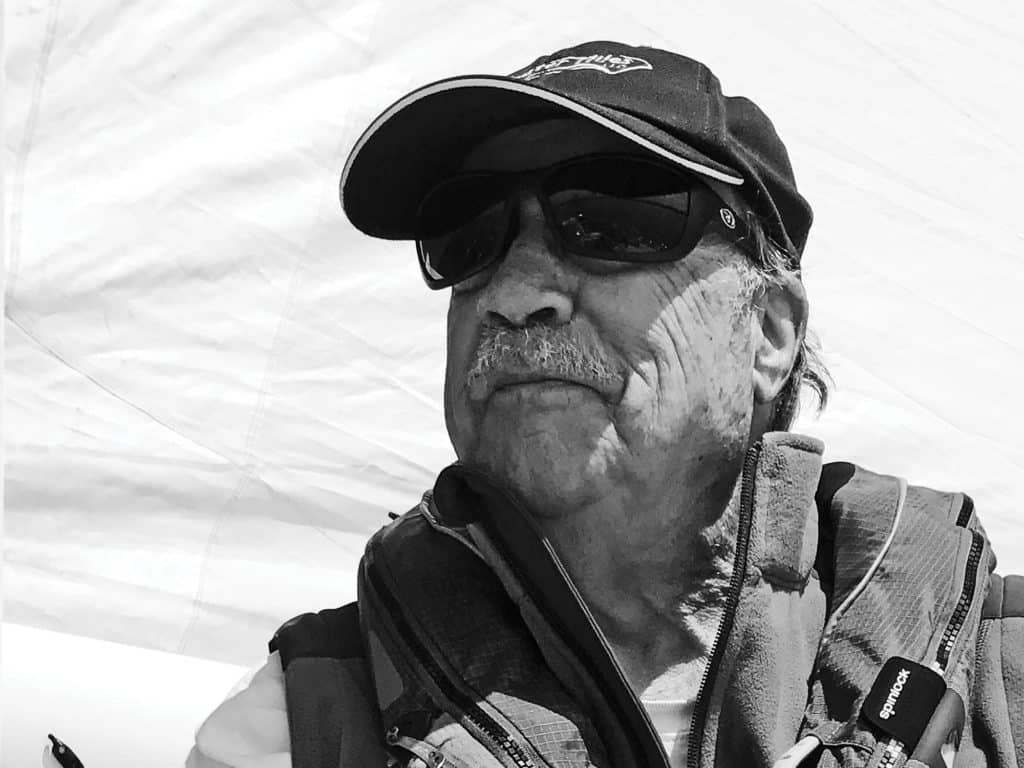
I heeded more good advice from Mike, who he told me: “You’ll always be the father. Christian, he’s your son, but he’s the captain. So keep your mouth shut. Be quiet and do your job.”
From the moment I stepped on board, that’s what I tried to do—an admittedly difficult task for someone with my bullish disposition. Our fellow crew were a married couple, Nathan Zahrt and Vivian Vuong, who had sailed with Christian before. Nathan was close to qualifying for his US Coast Guard captain’s license, and Vivian was a professional photographer as well as a great cook. My job was to follow orders and research everything we’d need to know about taking a boat through the Panama Canal—a job Christian was smart to give me, because I could do it well, building up yet more confidence before we set off.
As we left the dock on May 9, I felt good, but nervous about my first overnight watch from 0300 to 0600. After everyone else was asleep below, I had to rely on myself to settle down. Finally, I thought, quit babying yourself. You have a job to do. I did it—and everything went just fine. There was simply no room for fear.
A few days out of San Diego, our engine failed. It had run well during the boat’s sea trials, but it wouldn’t cooperate now. That malfunction meant we not only had to make an unscheduled repair stop, but we also had to hand-steer for long periods of time because we couldn’t charge the boat’s batteries if there was insufficient sunlight for the solar panels. No battery power, among other things, left us without the autopilot.
With the autopilot on, I was able to adjust and hold the boat’s course, but without the autopilot, I found it a lot harder to maintain our course, heading, and speed with all the water high above and all around us. I kept saying to myself, I will not use bad language. My friend Mike had told me: No swearing on the boat. So, I said to myself, Expletives deleted.
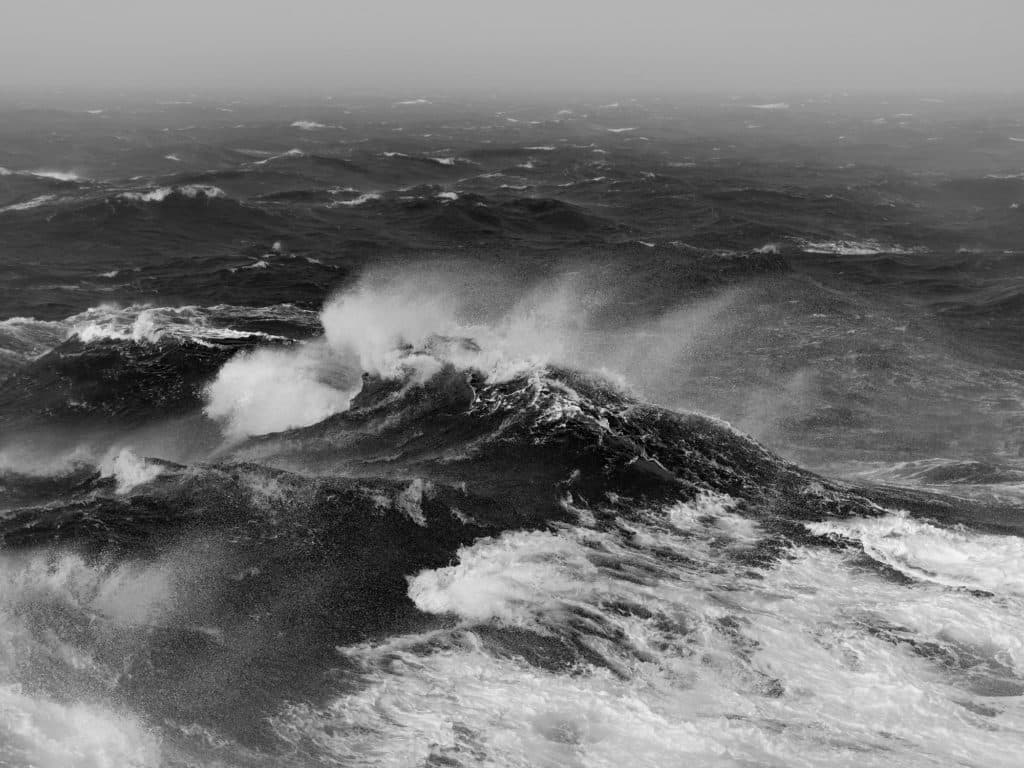
Instead, I focused on doing whatever Christian ordered me to do, and I gained a new appreciation for why so many of his Hylas clients and students had complimented him as a teacher over the years. I got to see my son as other people see him, and I was more impressed than ever.
For instance, there was a time when I was steering through the vast harbor of Panama City—doing six hours straight at the wheel—and a huge rock loomed ahead. Christian said, sharply, “Dad, you’re luffing.”
Now, I know better than to argue with the captain. But I replied that I was altering course slightly to avoid hitting the rock.
“Lose our headway, and we will hit the rock,” he said. “Hold your course, and do exactly what I say.”
He was right. “Aye, sir,” I said, suggesting that he explain everything to me in simple terms, as if I were his Boston terrier.
I always knew he was just footsteps away in case I needed him. I had done a lot of studying to learn about lights at night on boats, but once we were at sea, a lot of the lights seemed to be the same color. The first couple of times I saw them from the wheel, I was nervous because I couldn’t identify the vessels around us. I could see their courses, sort of, but I took comfort in Christian’s rule for the whole crew, which was to get him on deck immediately if there were any doubts.
For the most part, I just had to get over myself and try. Only once did I feel real panic. It was blowing like all the Furies of Hell, and I couldn’t see with all the water coming into my face. Christian went forward, and I lost sight of him. I thought he’d gone over the side.
This was my beloved son. I was in a momentary state of terror, calling, whistling and yelling his name.
Finally, he reappeared. “I wish you wouldn’t do that,” I told him.
“Dad,” he replied, “I’m not up there sightseeing.”
Enough said.
I found new levels of my own confidence—albeit with a dash of mutiny. One of Christian’s rules was that when we were on deck at night, we were not to leave the cockpit. We were tethered to a metal eye by the wheel. Well, one night, I could hear something flapping up forward. I got tired of the damn flapping. I knew the rule about staying in the cockpit, but I unhooked, attached myself to the jackline that ran bow to stern, and went forward to secure the piece of sail. I then took a big, deep breath and went back to the cockpit, where I snapped back into the metal eye.
Nobody was the wiser. I did tell Christian after we were home again, and he was not pleased. But I got away with it, and I felt useful.
There was also a lot of fun. Christian is a vegan, and Vivian is a great cook, but on my night in the galley, I got to make sushi from freshly caught fish. We had a red-footed booby perch happily on the pulpit one day, soon joined by others that sat on our bow railing and spinnaker pole, jostling for their favorite positions. One afternoon, I looked up just in time to see a huge manta ray leap out of the water. The majesty was breathtaking.
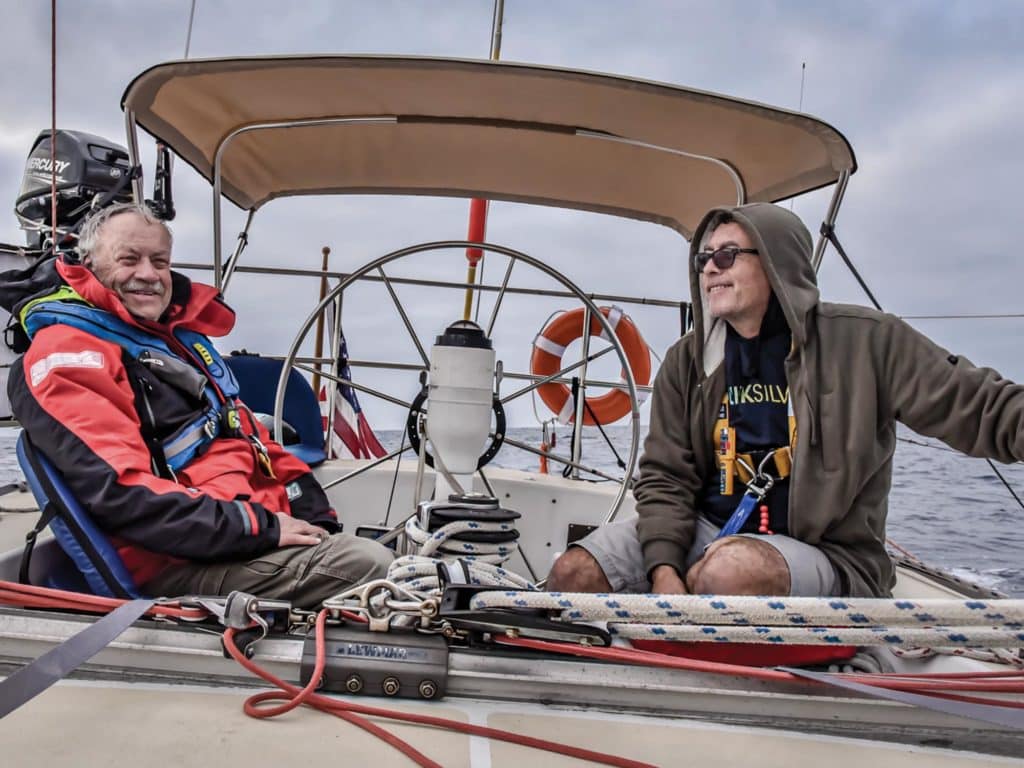
There was one night under beautiful, starry skies when I was doing a great job at the wheel. The boat was planing with sparkling phosphorescence in the bow waves and wake. I couldn’t help but start to sing in a bad impression of the Beatles: “Lucy in the sea with diamonds…”
Shortly after that, I saw the Southern Cross for the first time since years ago, when I had been on a hunting safari in Namibia. It was a glorious sailing night. You sure can’t do those kinds of things unless you take a chance and step aboard.
My run-in (or, should we say, fly-in) with the galley cabinet was not the only harrowing experience either. Both the Gulf of Tehuantepec and Punta Mala—just outside the Gulf of Panama—can have sudden, strong winds that extend 100 miles into the Pacific. I felt like I could see the gods smirking as they pounded us for days and nights. We had quite a few evenings of absolutely fierce lightning. I had never heard thunder like that booming stentorian basso profundo. Not since the monsoons of Okinawa, Japan, during my 13-month tour with the 3rd Marine Division, had I encountered such torrential rain. And we were truly alone out there—so much so that Christian, at one point, told Vivian to call out on the VHF radio, just to see if anyone answered. Nobody did. You know that cliche about how small we are? Well, we are.
It was during one of those storms that I took my header across the galley, but that moment was just one among many that were overwhelmingly positive. When we cruised into Panama City’s harbor under sail, amid all the ships anchored and underway, I was at the helm. Christian sat in the cockpit, calling out headings to me, while Nathan and Vivian stood as lookouts.
Suddenly, a huge container ship loomed, brightly lit from stem to stern. “Dad,” Christian said, “when she clears our bow, fall in behind her. Follow in her wake until I give you the new heading.”
I prayed that the wind would not die. I had to keep the sails full and maintain course. High above, I watched as the stern of the more than 1,000-foot-long container ship passed us.
From there, Christian wanted me to take our boat in, but I relinquished the wheel to Nathan, not wanting to push my luck. It was midnight on June 10 when, after a month at sea, we tied up at the pier. We had made it with no injuries to the crew and no damage to the boat. And I had accomplished my goals. I had stared down Neptune in his angry moments without flinching.
As I write this, I am now 83, and I don’t think I could trust myself to handle the physical or mental rigors again. But I’m very glad I made that trip with my son at age 78.
It was a highlight of my life.


